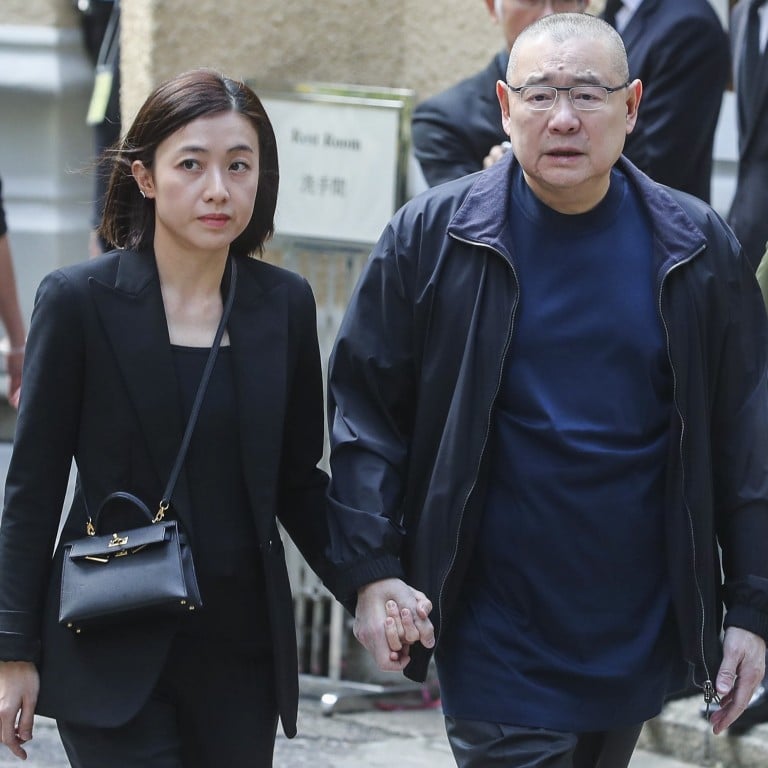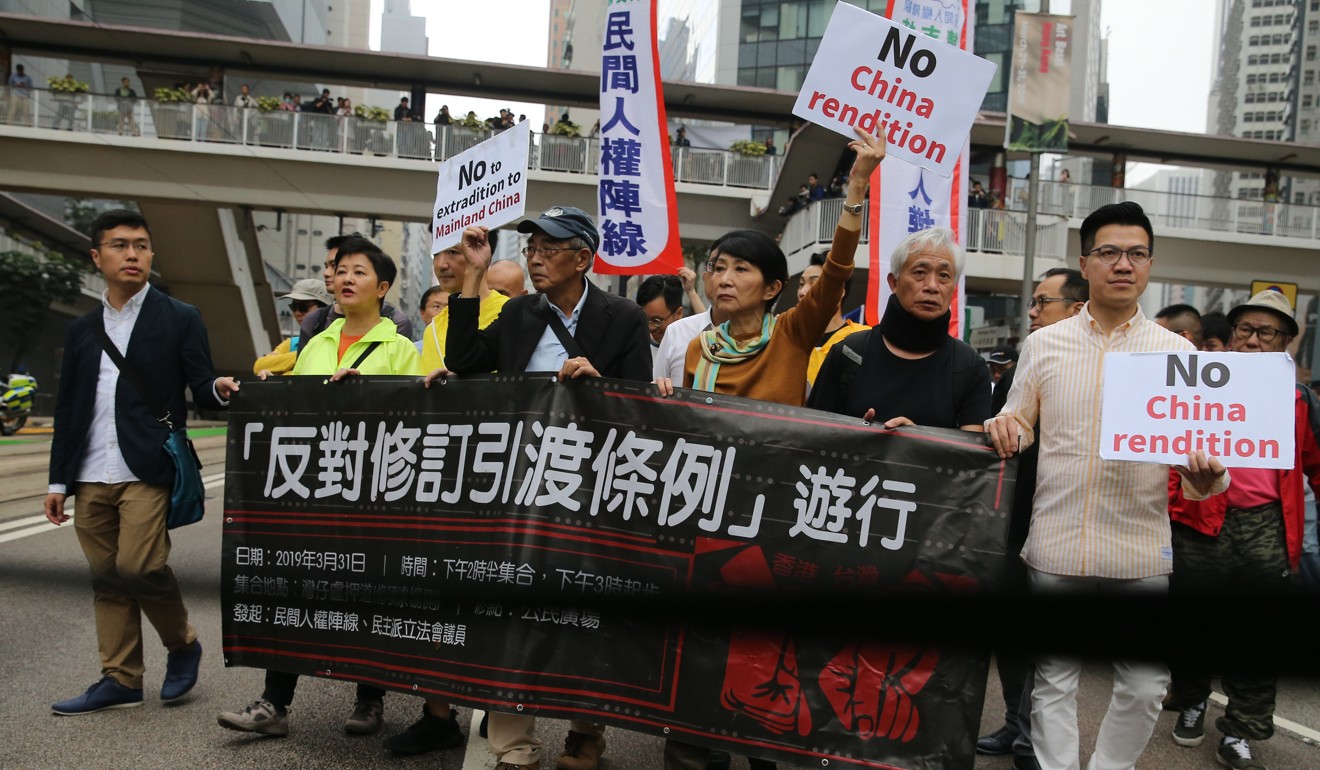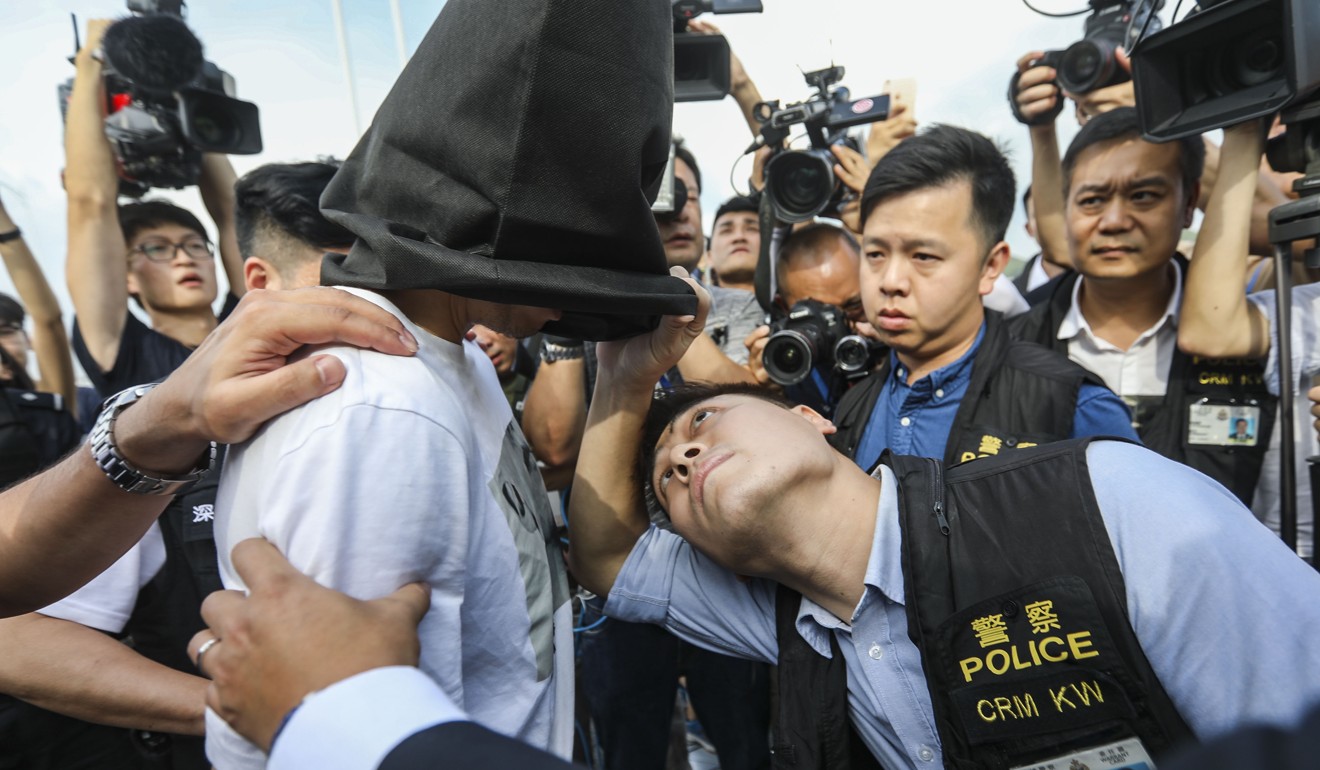
Fugitive tycoon Joseph Lau launches legal challenge against Hong Kong government proposal to change extradition law
- Billionaire Lau has been in hiding in Hong Kong since 2014 when he was jailed in absentia by Macau court for his part in massive bribery scandal
- Extradition proposal has become political headache for the government because of concerns Hongkongers could be victimised across the border
The fallout over the government’s controversial plan to allow the transfer of suspects from Hong Kong to mainland China, Taiwan and Macau intensified on Monday with fugitive tycoon Joseph Lau Luen-hung seeking to challenge it in court, even as the city’s leader doubled down on the extradition proposal.
Billionaire Lau, who is hiding in Hong Kong to avoid serving a jail term in Macau for bribery, applied for a judicial review of the government’s proposed changes to the extradition law that would allow the transfer of fugitives to jurisdictions that the city has no agreement with, on a case-by-case basis.
Observers saw Lau’s challenge as more of a political gesture than a case that the courts would entertain, while Chief Executive Carrie Lam Cheng Yuet-ngor insisted she would not withdraw the new extradition bill, regardless of mounting opposition that saw thousands take to the streets against it on Sunday.
“We won’t shelve the bill, which has been submitted to the Legislative Council for discussion,” Lam said, hours before Lau’s legal bid came to light. “[We] hope the scrutiny will be completed as soon as possible.”

The extradition plan has become a political headache for the government because of concerns that people handed over to mainland authorities could be victimised under a different legal system across the border, while both the international and local business communities have warned it could damage the city’s reputation as a haven for free commerce.
Lau and his business partner, Steven Lo Kit-sing, were found guilty of corruption and money laundering, having paid a HK$20 million (US$2.5 million) bribe to Macau’s ex-public works chief Ao Man-long, who was jailed for 29 years in 2012.
His legal challenge takes aim at the government’s proposed amendments to two existing laws – the Fugitive Offenders Ordinance and the Mutual Legal Assistance in Criminal Matters Ordinance. The first reading of the amended bill in the legislature is scheduled for Wednesday.
In a 44-page submission, Lau’s lawyers argued that the bill was unconstitutional and should not have any retroactive effect.
His legal team, led by Gerard McCoy SC and Robert Pang SC, asked the court to declare that surrendering Lau to Macau would violate the Bill of Rights, which guarantees everyone a fair trial.
They noted that the Macau trial was conducted in Lau’s absence years ago, and claimed it was “marred by ... serious procedural irregularities that rendered the trial incompatible with internationally mandated standards of fairness”.
Thousands take to streets against Hong Kong’s extradition proposal
While the proposed amendments did not mention any retroactive effect, Lau’s lawyers argued that a recent Security Bureau document given to Legco appeared to imply such power.
“The bill, once enacted, would hang over those it affects like a cloud,” they wrote.
The government has insisted on the changes to plug a legal loophole exposed by a recent homicide case, in which a Hongkonger wanted for allegedly murdering his girlfriend in Taiwan could not be sent over to the self-ruled island to face trial because of the lack of an extradition deal.
The bill, once enacted, would hang over those it affects like a cloud
Challenging the constitutionality of the amendments, Lau’s lawyers said the Bill of Rights and the city’s mini-constitution, the Basic Law, guaranteed residents freedom of movement while protecting them from unlawful arrest and detention.
They asked the court to rule it incompatible with those rights, if the chief executive were to be granted “unbounded discretion” to decide if anyone should face an extradition attempt.
Professor Johannes Chan Man-mun, a former law dean at the University of Hong Kong, said Lau’s judicial review application was “obviously premature”, given the bill had yet to be scrutinised by lawmakers.
“I suspect the real purpose of this judicial review application is not to obtain leave to argue it, but to highlight the ridiculous and potentially dangerous nature of this bill,” he said.
Chan also noted there was nothing to suggest the bill would be retroactive, meaning it could not be used to sort out the Taiwan murder case even if it were passed.
Principal law lecturer Eric Cheung Tat-ming, also from the University of Hong Kong, said Lau’s legal bid would face difficulties because the city’s courts tended not to tamper with legislative processes unless it involved something “very exceptional”.

Senior counsel Ronny Tong Ka-wah, one of Lam’s advisers in the Executive Council, also suggested
Lau might not be extradited because he had been tried in absentia.
Tong pointed to section five of the Fugitive Offenders Ordinance, which prevents an extradition in such a situation, unless the wanted person can be retried in the requesting jurisdiction.
But Lau’s lawyers said an early resolution of the issue “would serve to facilitate, and not hinder, the legislative process”.
“The consequences of the enactment of certain provisions of the bill may be immediate and irreversible, and give rise to substantial damage or prejudice,” they said, referring to the possibility that Lau could be put under immediate detention.
Pang said his team would not apply for an injunction, because they did not want to stop lawmakers from scrutinising the bill or challenge the legislature’s power. Instead, according to Pang, Lau was only taking a precautionary step.
“There’s no certainty on when the authorities may take action against Lau, and there is a presumption against bail in extradition proceedings – there’s no reason to file a legal challenge while in custody,” Pang said.
“Hong Kong law may not protect him, as Macau courts may still issue an order saying Lau waived his opportunity to contest the case.”
Lau, who claimed he was ill at the time, once signed a form giving consent for the trial to be held in his absence. Pang said Macau could claim Lau had already waived his rights and could still request his extradition.
The tycoon is also applying for a third legal heavyweight, London silk David Pannick QC, to join his team. The addition would require the approval of the courts.
The first hearing for the judicial review has been scheduled for April 17.
Lam’s extradition plan carries torture threat, Amnesty International says
He has suffered from renal failure, heart disease and diabetes, and underwent a kidney transplant in the same year.
In an interview for an online talk show with ex-lawmaker Emily Lau Wai-hing last week, Lau Ming-wai sidestepped a question on the extradition proposal.
“It is not that you don’t know who my dad is,” he said.
Additional reporting by Alvin Lum


